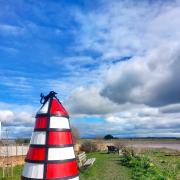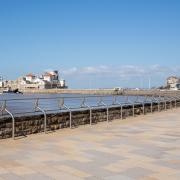Relive those summer beach holidays and at the same time volunteer for the Great British Beach Clean and help protect wildlife and your coastline. Holly Louise Eells finds out more

From the impressive beauty of Brean to the seaside town of Weston-Super-Mare, the county has been blessed with some of the most magnificent stretches of sand. Nevertheless, Somerset's beaches are not immune to the serious threat the UK's coastline and marine life are under from litter in our seas, which resorts to hundreds of species accidentally eating or becoming entangled in rubbish.
From September 20-23, The Great British Beach Clean (GBBC), the biggest beach clean and survey in the UK is joining forces with volunteers and Beachwatch (Marine Conservation Society) and taking action all across the country to freshen up the coastline. They are a variety of beaches involved who are fighting against plastic pollution in the county, including Sand Bay and Chesil Beach, but there are still so many local beaches that need your help and support.
Local Beachwatch organiser and Heritage & Outreach Officer, Abbie Edbrooke from the award-winning Clevedon Pier arranges beach cleaning and surveying events around the 100-metre section of shoreline, including Ladye Bay and Sand Bay. She says, "The tide of litter washing up on our shores is not just unpleasant to look at, but it can harm and even kill some of our best-loved marine wildlife."
"More than 170 species including seabirds, turtles and whales have mistaken marine litter for food and actually eaten it, which in many cases has resulted in starvation, poisoning and ultimately a slow, painful death. Plastic packaging and discarded fishing nets also injure, entangle and drown some of Britain's favourite marine animals, including seals and dolphins."

It is important to remember that it's an ecosystem made up of thousands of living creatures doing their best to survive. Over the centuries our coastline has been intensely developed and utilized for both pleasure and commercial opportunities, so therefore it is our duty to protect and preserve what we can for ourselves and future generations.
Marine Conservation Society (MCS) is one of the only organizations in the UK to not just collect litter, but survey the data (no matter how dirty or clean the beach is), which has helped them lobby government to make a real difference to our shores. Data collected by volunteers from the remarkable 25 years of MCS-led 'Great British Beach Cleans' has been influential in the introduction and achievement of the 5p single-use carrier bag charge, the ban on microbeads in personal cleaning products like shower gels and toothpastes, the commitment to a Deposit Return Scheme in Scotland (and the consultation on one in England and Wales), and a remarkable ban on plastic straws, stirrers and cotton buds in England from next year.
"When the plastic bag charge was introduced, our Beachwatch data was crucial evidence to lobby this, but also show the positive effect (as a 40 per cent plastic bag litter decrease occurred the following year at our event)", says Lizzie Prior from Marine Conservation Society.
"The information our volunteers have collected over the last 25 years has helped make some of the most significant impacts on beach litter ever, including the plastic bag charge, microplastics banned in personal care products, better wet wipe labelling, and massive support for a tax on 'on the go' plastic single use items."

MCS says it hopes the 26th Great British Beach Clean will continue to smash records when it comes to volunteer numbers, but not litter amounts. The charity is appealing for more organisers to lead even more beach cleans around the UK coastline and Lizzie believes beach cleaning is turning more mainstream.
"Cleaning so many individual beaches last year was a fabulous achievement by our volunteer cleaners and organisers," she says. "Finally, beach cleaning is becoming cool and we're delighted, we've waited 25 years for this moment! But we know that it's only the tip of the iceberg. There are hundreds and hundreds of beaches around our coasts that have never been cleaned and surveyed - and it's the collection of this data that is so important to getting even more positive actions implemented than have already been achieved in the last year or so."
"It is appealing for people to become part of the solution to the litter problem that is engulfing UK beaches by adopting a beach and leading a clean-up and survey during this year's GBBC. During last year's event, volunteer cleaners picked up over 600 items of litter for every 100m of UK coastline surveyed. Just short of 15,000 volunteers took part - double the number in 2017. We hope to have even more people cleaning up Britain's beaches this September than we did last year, so registering your events with us soon is invaluable," she adds.
Less litter on UK beaches will save the lives of some of our best loved marine wildlife, protect our kids when they're building sand castles and show the world what the great British seaside really looks like beneath its escalating mountain of rubbish.
This year, for the first time, the Great British Beach Clean will be sponsored by the Ocado Foundation, the charitable arm of the online supermarket. The Foundation will be sponsoring the event to the tune of £300,000 as part of the Environmental Pillar of its 'Ocado Way 2020 Vision'.
Anne Thwaites is the MCS Corporate Partnership Manager who will be working closely with the Ocado Foundation. She says Ocado's drive for operational efficiency and sustainability is very encouraging: "Working with the Ocado Foundation is a fantastic opportunity for us to share best practice on a joint vision to reduce single-use plastics in the business as well as the domestic environment. We are impressed with Ocado's drive towards minimising their ecological footprint and will work together on beaches across the UK this September to support thousands of volunteers who will be part of the biggest GBBC yet."
How can you help:
f you are looking to become a Great British Beach Clean organiser, it couldn't be easier. Find a local beach you want to clean, sign up and register it on the MCS online system and they will provide you with all the help you need to get going.
Frances Pearson and Tony Bramley are keen volunteers who help and support their coastline around Clevedon Pier. "We are all too aware of the state of our marine environment," they explain. "So, we like to help and encourage others with carrying out beach cleans and hopefully making a small difference to the cleanliness of our coastline and, in particular, removing some of the plastic debris that can have such a devastating effect on wildlife."
For more information visit mcsuk.org/beachwatch.



























